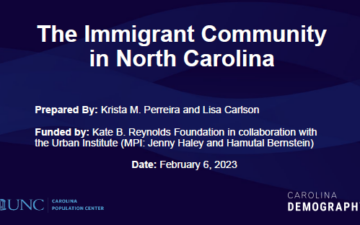NC in Focus: Black Population in North Carolina, 2016

February marks the arrival of Black History Month, dedicated to celebrating the achievements of Black Americans throughout history. It began as a weeklong celebration in 1926, selected to correspond with the birthdays of Frederick Douglass on February 12th and Abraham Lincoln on February 14th. 50 years later, President Gerald Ford officially recognized the entire month for this commemoration.
2.2 million
The total black or African-American population, alone, in North Carolina, as of 2016. This is 22% of North Carolina’s total population.
An additional 155,269 residents identified as black or African American in combination with another race. In total, 2.35 million individuals identify as black or African-American (alone or in combination), accounting for a total of 23% of the state population.1
2.7 million
The 2035 projected black population, according to the North Carolina Office of State Budget and Management. This is an increase of half a million new residents or 22% in the next 19 years. Because the state’s black population is projected to grow at nearly the same rate as the state overall (21%), black North Carolinians will comprise a similar share of the state’s population in 2035 (22%) as they do today.2
6
The number of counties in North Carolina that had a black population of 100,000 or more in 2016.*
Mecklenburg County ranks #1 with a population of 344,627 black or African-American residents. The remaining five county populations, in order, are: Wake (221,671), Guilford (180,180), Cumberland (126,586), Durham (117,388), and Forsyth (101,641).3
*Note: this population estimate includes individuals who identify as black alone regardless of ethnicity, meaning it includes both non-Hispanic and Hispanic black residents.
3.5%
The share of North Carolina’s total black population that identified as Hispanic in 2016, up from 3.2% in 2013.
Among the 6 counties with the largest black populations, residents in Guilford County were the least likely to identify as Hispanic (2.6%) while black residents in Forsyth County were much more likely to report Hispanic ethnicity (5.9%).3
35.5
The median age of the black population, for both sexes, in North Carolina.1
69%
The percentage of the black population born in North Carolina – 12 percentage points higher than the share of all residents born in the state (57%).1
9%
The percentage of the black population (18+), that has military veteran status. This is just over 142,000 individuals.1
172,996
The number of black students enrolled in college or graduate school in North Carolina.1
$1.7 billion
The estimated total economic impact, based on 2014 data, of North Carolina’s Historically Black Colleges and Universities (HBCUs), according to a report published by UNCF and the University of Georgia.
This estimate includes the direct spending made by HBCUs on its faculty, staff, academic programs and students, as well as the indirect effects which occur as a result of that spending.4
264,200
The estimated number of black residents working in management, business, science, and arts occupations in North Carolina.1
4.2%
The percentage of firms in North Carolina with paid employees that are black-owned. They received 1.3% of total receipts in 2012.5
In certain regions of the state, this share is much higher. In the Sandhills, for example, 21% of the region’s firms are black-owned.6
Need help understanding population change and its impacts on your community or business? Carolina Demography offers demographic research tailored to your needs.
Contact us today for a free initial consultation.
Contact UsCategories: NC in Focus
Tags: African American, American Community Survey, black, Black History Month, census, population estimates, population projections, U.S. Census Bureau

The Center for Women’s Health Research (CWHR) at the University of North Carolina School of Medicine released the 12th edition of our North Carolina Women’s Health Report Card on May 9, 2022. This document is a progress report on the…

Dr. Krista Perreira is a health economist who studies disparities in health, education, and economic well-being. In collaboration with the Urban Institute, she recently co-led a study funded by the Kate B. Reynolds Foundation to study barriers to access to…

Our material helped the NC Local News Lab Fund better understand and then prioritize their funding to better serve existing and future grant recipients in North Carolina. The North Carolina Local News Lab Fund was established in 2017 to strengthen…
Your support is critical to our mission of measuring, understanding, and predicting population change and its impact. Donate to Carolina Demography today.